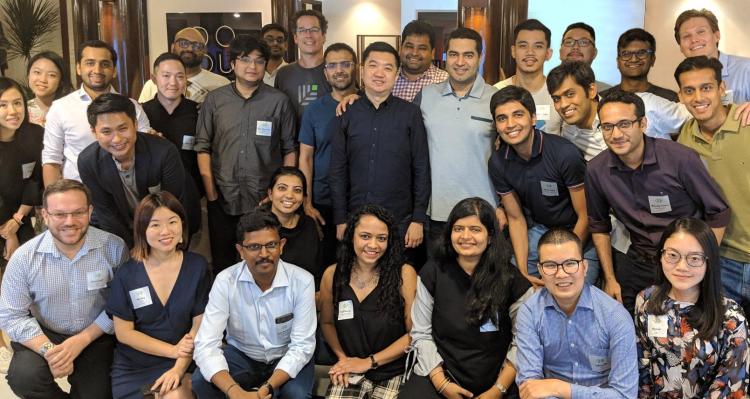Back in January, Sequoia India announced plans for its first early-stage startup accelerator program in India and Southeast Asia, and today the firm revealed the first cohort of 17 startups.
To recap, the program — which is called Surge — gives each startup a $1.5 million check and participation in a four-month program that’s split across India and Singapore, as well as the wider Sequoia global presence in China and San Francisco.
The program kicked off last month, but the startups were only unveiled for the first time today — here they are:
- Azani Sports: a “full stack” sports clothing startup based in India that sells online and through selected high street retails
- Bobobox: a capsule hotel company based in Indonesia
- Bulbul: a live-streaming service with a focus on e-commerce across India
- DancingMind: a Singapore startup that uses VR to enable remote care for stroke victims and patients of debilitating diseases like Parkinson’s
- Doubtnut: an India-based education startup that uses photos, videos and AI
- Flynote: a travel booking service with a focus on personalized trips
- Hippo Video: a platform developing, editing and analyzing marketing and sales videos
- InterviewBit Academy: a computer science training and development platform in India — that’s not unlike recent Y Combinator graduate Skill-Lync
- Khatabook: an accounting service for SMEs in India that already claims 120,000 weekly users
- Qoala: a micro-insurance startup based in Indonesia, which competes with rivals like PasarPolis — which is backed by three of Indonesia’s unicorns
- ShopUp: a social commerce startup that helps sellers in Bangladesh do business through Facebook — that’s a similar concept to established Indian startups Meesho (another YC alum) and LimeRoad, which enable sellers on WhatsApp
- Skillmatics: a startup headquartered in India that develops learning games for pre-school and primary school kids aged under 10
- Telio: a b2b commerce platform that aims to digitize the process of brands and wholesalers selling to retailers
- Uiza: a Singapore-Vietnam startup that lets publishers and companies develop their own video infrastructure independent of platforms like YouTube
- Vybes: an e-commerce platform for social media influencers that’s based out of Singapore
- Zenyum: a startup that provides invisible braces for consumers in Southeast Asia at a lower cost than traditional alternatives
There’s one additional startup, which is being kept “under the radar” for now, Sequoia said.
Sequoia India managing director Shailendra Singh previously told TechCrunch that Surge would support a “curated” selection of fellow VCs who could invest in the cohort alongside the firm, and Sequoia said that the 17 startups have attracted a total of $36 million in investment. A spokesperson also pointed out that five of the selections have at least one female co-founders, which is almost certainly above average for the region, although it is tricky to get reliable data covering India and (in particular) Southeast Asia.
Surge is an interesting effort for Sequoia, which has traditionally played in post-seed and growth stages of the investment cycle. Sequoia closed its most recent fund for India and Southeast Asia at $695 million last year, and it also has access to a globally active “growth” fund that is targeted at $8 billion. Reports have suggested that Surge will get its own sparkling new $200 million fund, which would make a lot of sense, given the potential conflict and confusion of investing via its main fund. But the firm is declining to comment on that possibility for now.
One major addition to the program that has been confirmed, however, is Rajan Anandan, the executive who previously ran Google’s business in India and Southeast Asia and is a well-known angel investor. His arrival was announced earlier this month and he will lead the Surge initiative.
His recruitment is a major win for Sequoia, which is betting that Surge’s early-stage push will reap it richer dividends in India and Southeast Asia. That part remains to be seen, but certainly, there is a dearth of early-stage programs in both regions compared to other parts of the world.










